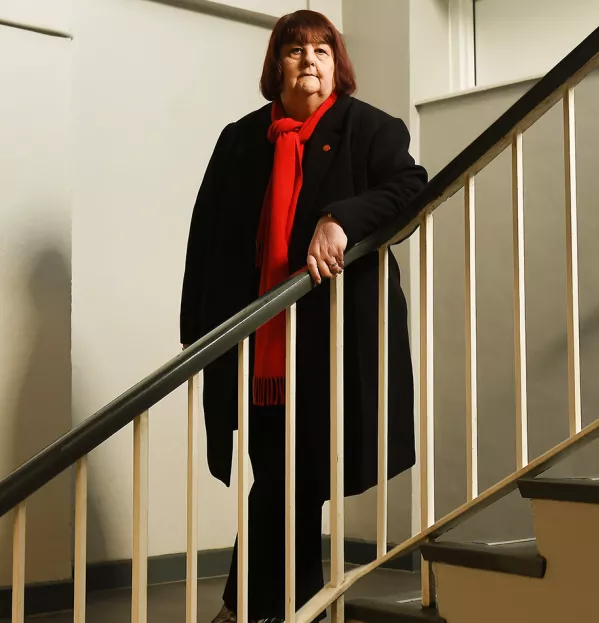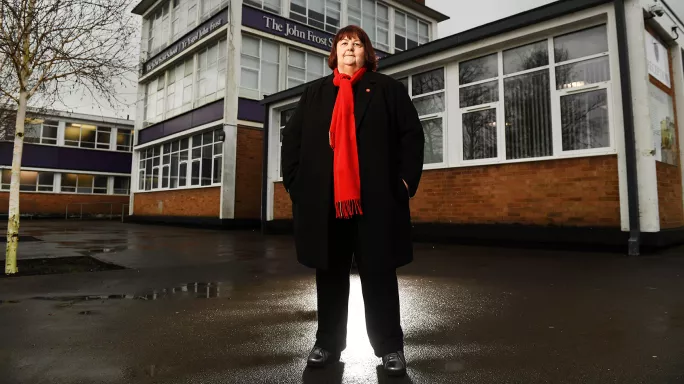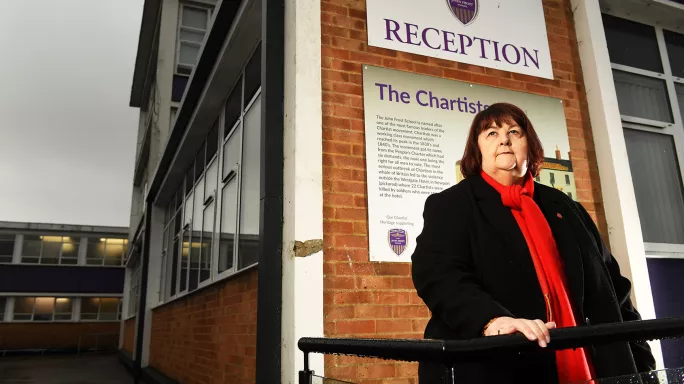- Home
- Leadership
- Staff Management
- 10 questions with...Baroness Wilcox
10 questions with...Baroness Wilcox

Baroness Wilcox is a Labour peer who serves as the party’s education whip in the House of Lords. She worked as a teacher for 35 years, and was Newport City Council leader from 2016 to 2019.
Answering Tes’ 10 questions, she talks about her primary school’s creative curriculum, her dislike of “boring, old-fashioned” lessons at grammar school, being “master” of the classroom, and why she never aspired to be a head.
1. Who was your most memorable teacher?
I was in primary school throughout the 1960s, and what was so remarkable about Miss Maliphant was that she was very modern. You’d expect a little [Welsh] valley school to be a bit behind the curve, but not with Miss Maliphant. We did an awful lot of creative and artistic things, including photography and a school magazine; that was quite revolutionary and unusual for such a little valley school.
I had an email out of the blue this summer from a lady in Cardiff, who said her elderly neighbour, Miss Maliphant, had seen something about me becoming a peer and remembered me, which I just thought was wonderful. I wrote back to the lady, and I sent a photograph of me in the House of Lords peers’ outfit.
2. What did you most enjoy about school?
By the age of 10, I was the editor of the school magazine. I had my own typewriter, which I loved. Miss Maliphant taught us how to take and develop our own photographs. I didn’t realise the effect that would have but 35 years later I was teaching media studies.
These were interests that weren’t fulfilled [at secondary school]. I was one of the last people to do the 11-plus and went to the county girls’ grammar school, where our artistry and creativity were somewhat stifled by a focus on Stem [science, technology, engineering and maths] subjects.
I couldn’t switch into maths and science. I used to try very hard to listen and understand but I couldn’t. I was clearly very bright but I just couldn’t get that way of teaching; it was very didactic, from a textbook. Unless you could respond to that very boring, straight, old-fashioned way of teaching, it was a struggle. We understand the different varieties of learners now but they didn’t in the early 1970s.
3. Why did you choose to work in education?
I was always in school productions and later went to Central School of Speech and Drama. I didn’t go down the line of performing because I went into songwriting and production [with a London studio]. We had some moderate success but nothing great - we did pop music, including for the Eurovision Song Contest.
But I had to work and earn money. I couldn’t fall back on my parents - we didn’t have much money. When I went into in my final year at Central, I was supply teaching as well. It was £25 a day, which was a fortune. But it was so tough.
More Tes’ 10 questions:
- Adrian Rogers, chief executive officer of Chiltern Learning Trust
- Julie Robinson, chief executive of the Independent Schools Council
- Tom Campbell, CEO of E-ACT multi-academy trust
I was working in a school in Stockwell and it was just before the Brixton riots. There was a palpable disquiet in the air. I remember, on the first day, going out at lunchtime and I was crying into my milkshake. But I’m a great fan of The Sound of Music and I love that song by Julie Andrews, I Have Confidence. So I just girded my loins and I went back for the afternoon.
I realised I enjoyed [teaching] and was good at it. There was a sense of fulfilment and a sense of structure. If you love it, it’s a great job.
4. What has been your proudest moment?
It was my last A-level theatre studies group. An 18-year-old girl in my class came to me and said, “Miss, I’m three months’ pregnant.” I persuaded her to finish her A levels. She got through the practical, the coursework and the exams. By the time she took her exams, she was six months’ pregnant. She was never the best academically - she was lacking in confidence and support - and she got two Es, which is the lowest pass, but it’s a pass.

When she was 25, she went to university - because she had those two Es. And that sums it up for me, really: if we hadn’t got her through, if I hadn’t done what I did, then she would have left with nothing. But five to six years later she was able to use that learning and move on with her life, and you can’t buy that.
5. What do you regret?
I regret not moving around more and maybe looking for promoted posts, but I was happy where I was [teaching in South Wales]. You don’t stay somewhere 20 years if you’re not happy.
I taught English for the first 10 years of my career, then I moved into media studies and also theatre studies. I never made the dizzying heights of deputy head or head - that was a deliberate choice. I really enjoyed the interaction and the day-to-day teaching more than anything.
6. What are the best parts of the English school system?
The best aspect is being master of your own destiny in your classroom. You can develop things in the way that you think is best for the children in your charge. The English school system allows this to an extent, but it could go further, especially when senior managers trust their staff and allow them freedom to deliver within an albeit regulated system.
You have to put up with the vagaries of management and being told what to do by people that perhaps you don’t respect, which is always an issue. But nevertheless, you are your own boss in your classroom. And what happens in that classroom is so down to you. It’s a massive sense of responsibility, and if you get it right, you absolutely get it right.
7. What are the worst parts of the education system?
I think the worst aspect is government interference and changing plans and moving things around. I found that very frustrating in my career, and I’m sure that teachers do today.

8. What will schools look like 30 years in the future?
Each school has got its own ethos and own set of communities, and I think it’s important to understand that. So it will never be one-size-fits-all, there will never be homogeneity.
I don’t think you will ever be able to work from home if you’re a teacher - I think what the pandemic showed us was the wonderful ingenuity of the education sector and teachers, and how they adapted to ensure that learning went on. But that caused gaps, with a lack of interaction and socialisation.
9. Who have been your biggest influences in education?
Sir Tim Brighouse [the educationalist and former schools commissioner for London, who died in December 2023].
I think he always consistently brought common sense to the table and made changes for the better. I followed him throughout my career and agreed with and listened to what he said.
I’d also include the best headteacher I ever worked for, Kevin Mullins. He headhunted me - as he did with many of his staff - to come and work at Hawthorn High School in Pontypridd.
He was a colourful character and a true educator in every sense of the word. My career at that point was in the doldrums. He saw my potential through friends he had at my school in Newport and sought me out to become his new head of drama and media studies. It gave me such an opportunity to really develop my individual teaching style, as he trusted his staff to do their best for the children.
He retired and only lived for two years afterwards, and he was greatly mourned by the school and the wider community. If all schools had his empathy, understanding and respect for his staff and students, then education would be a better place.
10. What would you change if you were education secretary?
Listening to the profession and engaging with what teachers are telling us is a great starting place. We need to build back - we just need to build everywhere, literally in the case of RAAC [reinforced autoclaved aerated concrete] in schools.
You need a Tes subscription to read this article
Subscribe now to read this article and get other subscriber-only content:
- Unlimited access to all Tes magazine content
- Exclusive subscriber-only stories
- Award-winning email newsletters
Already a subscriber? Log in
You need a subscription to read this article
Subscribe now to read this article and get other subscriber-only content, including:
- Unlimited access to all Tes magazine content
- Exclusive subscriber-only stories
- Award-winning email newsletters



